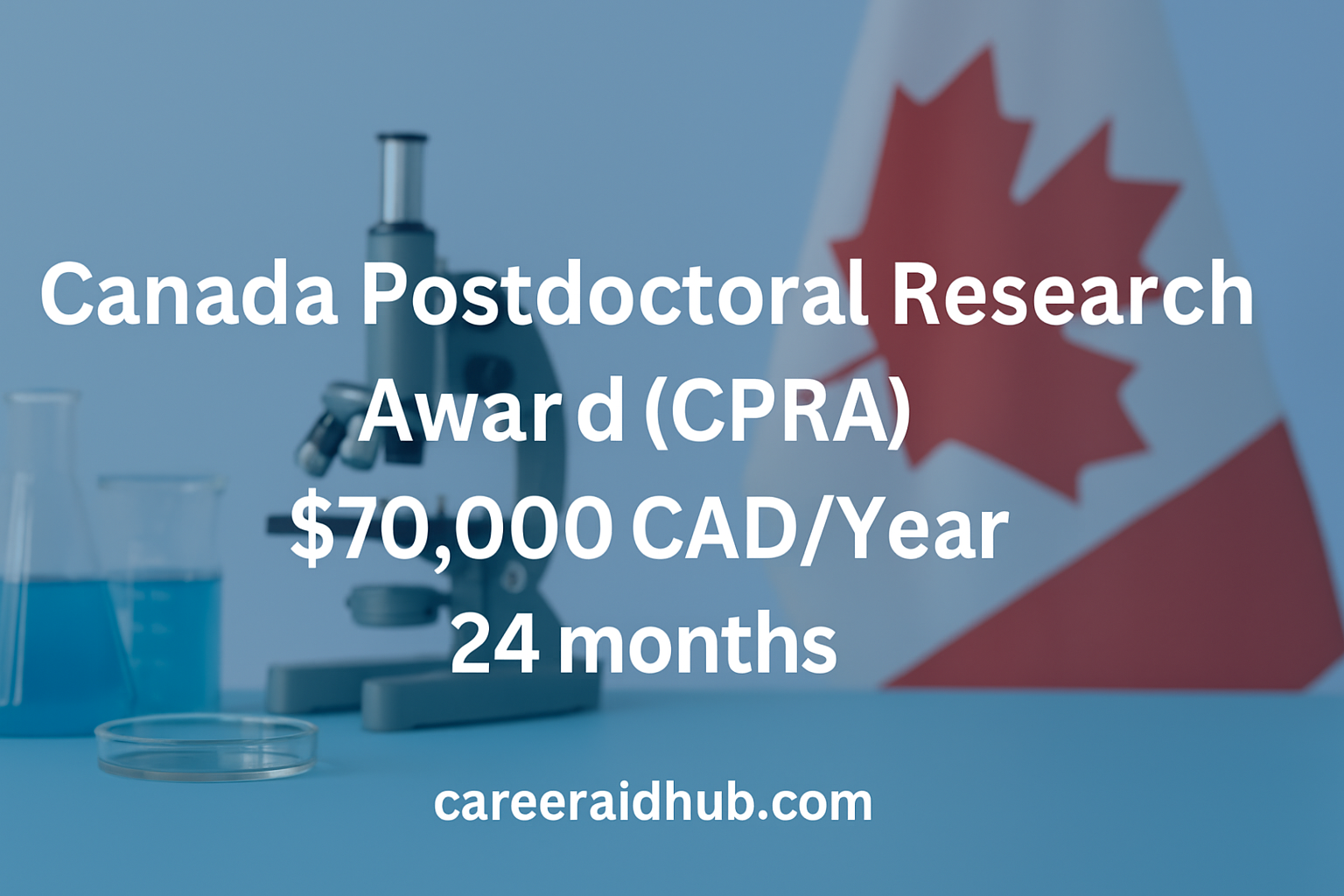Alexander von Humboldt Foundation Fellowship 2025–2026: Fully Funded Research Opportunity in Germany
The Alexander von Humboldt Foundation’s Humboldt Research Fellowship is a globally recognized opportunity for researchers seeking to conduct advanced studies in Germany. Renowned for its support of international academic exchange, this fellowship empowers scholars from around the world to collaborate with top-tier German institutions while expanding their professional horizons. With funding tailored to both postdoctoral and experienced researchers, the fellowship emphasizes academic freedom, inclusivity, and global networking, making it one of the most impactful programs in international research mobility.
Explore the Humboldt Research Fellowship 2025–2026—funding, eligibility, and application guide for global researchers in Germany.
About the Alexander von Humboldt Foundation
Fellowship Name
Alexander von Humboldt Foundation
Purpose and Mission
The Humboldt Research Fellowship enables researchers at different career stages to pursue independent research in collaboration with a host institution in Germany. The program’s core mission is to foster international academic partnerships, promote scientific innovation, and support knowledge exchange across global and disciplinary boundaries.
The fellowship not only funds research but also opens avenues for scholars to immerse themselves in Germany’s rich scientific culture. Researchers are encouraged to develop long-term collaborations that transcend borders, promoting sustainable academic and cultural linkages.
About the Alexander von Humboldt Foundation
The Alexander von Humboldt Foundation is a leading German institution dedicated to promoting excellence in research. Named after the 19th-century explorer and scientist Alexander von Humboldt, the foundation funds highly qualified international scholars and offers access to an elite academic network in Germany and beyond.
Importantly, the foundation is committed to inclusion and diversity, actively welcoming applications from women, underrepresented groups, and researchers from regions with limited academic mobility. Its inclusive approach enhances the global character of its alumni network, which today includes over 30,000 researchers worldwide.
Who Can Apply?
The Humboldt Research Fellowship supports two primary categories of applicants:
1. Postdoctoral Researchers
Must have completed a Ph.D. within the past four years.
Candidates who are within six months of completing their doctorate may also apply if they can provide a written summary of their doctoral findings.
Must present a record of publication in reputable, peer-reviewed academic journals.
2. Experienced Researchers
Must have completed their Ph.D. within the past twelve years.
A significant track record of publications in internationally recognized journals is required.
Special Provision: In cases where a Ph.D. is not customary in the applicant’s field or country, candidates may apply up to 16 years after completing their qualifying postgraduate degree, provided they have a strong academic record.
General Requirements
Residency Rule: Applicants must not have lived in Germany for more than six months within the last 18 months before applying.
Language Skills: Fluency in English or German is mandatory, depending on the language of the proposed research project.
Eligible Disciplines for Alexander von Humboldt Foundation
Researchers from all academic fields are encouraged to apply. Common areas include:
Natural Sciences (e.g., Physics, Chemistry, Earth Sciences)
Engineering and Technology
Life Sciences and Medicine
Social Sciences (e.g., Economics, Political Science)
Humanities (e.g., History, Philosophy, Literature)
Mathematics and Computer Science
This interdisciplinary openness ensures that the fellowship remains inclusive and accessible across a diverse range of knowledge domains.
Application Process: Step-by-Step Guide
Step 1: Identify a Host Institution
Applicants must secure a formal invitation letter or collaboration agreement with a recognized research institution or university in Germany. This institution will serve as the host during the fellowship period.
Step 2: Prepare Application Documents
Essential documents include:
An updated Curriculum Vitae (CV) detailing academic history, awards, and current affiliations.
A detailed research proposal, clearly outlining objectives, methodology, and expected impact.
A list of key publications, especially those in peer-reviewed journals.
Reference letters from academic mentors or collaborators.
Host institution’s confirmation of collaboration.
Step 3: Submit the Application
Applications must be submitted through the official Humboldt Foundation online portal. Incomplete or delayed submissions will not be considered.
Step 4: Await the Decision
After submission, applications undergo a rigorous peer-review process. Final decisions are typically communicated within 4 to 6 months.
Tips for a Strong Application
Align your research objectives with current scientific or global challenges.
Highlight your academic achievements and how your experience complements your host institution’s work.
Demonstrate the impact your research could have at the global or societal level.
Maintain clarity and precision in your proposal writing.
Emphasize mutual benefits of collaboration for both applicant and host institution.
Financial Support and Fellowship Duration
For Postdoctoral Researchers
Monthly Stipend: €2,700
Duration: 6 to 24 months (can be divided into three flexible stays over a three-year period)
For Experienced Researchers
Monthly Stipend: €3,200
Duration: 6 to 18 months (divisible into up to three stays)
Additional Financial Benefits
Travel Expenses: One-time allowance for international and domestic travel
Family Allowance: Support for accompanying family members
Language Course Funding: Subsidized German language classes (before or during the fellowship)
Research Subsidy: Financial support to the host institution for research-related expenses
Extension Grants: In select cases, short-term extensions may be granted for project completion
Application Timeline
Application Period: Applications are accepted throughout the year.
Evaluation Period: Typically 4–6 months from submission date.
Start of Fellowship: Flexible — start date to be mutually agreed upon with the host institution.
There is no official deadline, making this program ideal for researchers who need flexibility in planning their international move.
Life in Germany: A Researcher’s Perspective
Germany offers a rich intellectual environment, home to some of the world’s most respected universities, laboratories, and research institutes. With a robust public research system and significant R&D funding, researchers in Germany benefit from:
Access to cutting-edge infrastructure and world-class libraries.
A high standard of living, universal healthcare, and public transportation.
Affordable housing and cost-effective family-friendly benefits.
Opportunities for inter-European collaboration through the EU’s research mobility programs.
Immersive cultural experiences through art, history, and language.
Fellows also benefit from networking events, alumni connections, and integration activities organized by the Humboldt Foundation.
Contact and Support
For queries related to eligibility, application status, or host institution arrangements, applicants may reach out to the foundation directly.
Email: [email protected]
Phone: +49-228-833-0
Final Thoughts
The Humboldt Research Fellowship offers a gateway to academic excellence, global recognition, and professional growth. It is more than just a funding program—it’s a platform for building lasting scholarly partnerships, innovating across disciplines, and experiencing the vibrant academic landscape of Germany.
Whether you’re a postdoctoral scholar launching your research career or a seasoned academic seeking deeper collaboration, this fellowship provides the structure, support, and prestige needed to take your work to the next level.
Summary Table: Humboldt Research Fellowship at a Glance
| Field | Details |
|---|---|
| Fellowship Name | Humboldt Research Fellowship |
| Organization | Alexander von Humboldt Foundation |
| Host Country | Germany |
| Eligible Applicants | Postdocs (Ph.D. within 4 years), Experienced Researchers (Ph.D. within 12 years) |
| Fellowship Amount | €2,700 (Postdocs); €3,200 (Experienced) |
| Duration | 6–24 months (Postdocs); 6–18 months (Experienced) |
| Application Deadline | Rolling, accepted year-round |
| Research Fields | All disciplines |
| Submission Method | Online via official portal |
| Family and Travel Support | Yes |
| Language Requirement | English or German proficiency |
Official Reference: Humboldt Research Fellowship
FAQ
Postdoctoral researchers (up to 4 years post-Ph.D.) and experienced researchers (up to 12 years post-Ph.D.) across all disciplines can apply.
Secure a host institution in Germany, prepare required documents (e.g., CV, research proposal), and apply online via the Humboldt Foundation portal.
Postdocs: 6–24 months; Experienced researchers: 6–18 months. Both are flexible and can be split into three stays within three years.
No, the Humboldt Fellowship is open to researchers of all nationalities and disciplines.
A Ph.D. or equivalent academic qualification is required. Exceptions apply for fields where Ph.D.s are uncommon, allowing applications up to 16 years post-master’s degree.
Applications are accepted year-round, and selection meetings occur every 3–4 months.
CV, research proposal, recommendation letters, and a list of publications.
Approximately 20–25% of applications are approved during selection meetings.
Yes, you can reapply if you meet eligibility criteria and have addressed the feedback from your previous application.
Travel costs for the fellow and their family are covered as part of the benefits.
Extensions may be possible based on the fellowship type and research requirements.
Researchers from developing nations contributing to sustainable development are encouraged to apply for the equivalent Georg Forster Research Fellowship.




